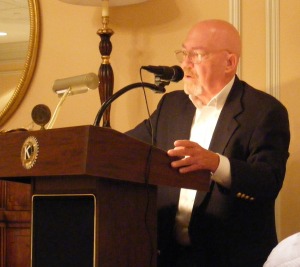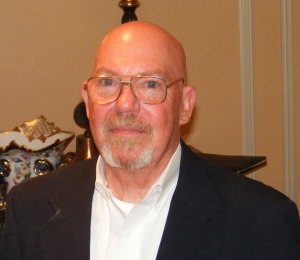Although this happened a few years ago, a supporter recently sent us this information. We thought it would be of interest.
THE MAN CONVICTED OF ONE OF THE WORST WAR CRIMES IN AMERICAN HISTORY TAKES QUESTIONS IN A RARE PUBLIC APPEARANCE IN COLUMBUS, GEORGIA
“There is not a day that goes by that I do not feel remorse for what happened that day in My Lai, “ William Calley told members of the Kiwanis Club of Greater Columbus today. His voice started to break when he added, “I feel remorse for the Vietnamese who were killed, for their families, for the American soldiers involved and their families. I am very sorry.”

William Calley, Jr., speaking to the Kiwanis Club of Greater Columbus, Columbus, GA
The former Army lieutenant, a Fort Benning OCS graduate, who was convicted for his part in the mass murders of between a reported 300 and 500 civilians at My Lai, Vietnam, who refused to do interviews with the top network reporters, reporters like Mike Wallace who wanted him to appear on CBS’ Sixty Minutes, gave an interview to Kiwanians and guests, including me. When TV commentator and former newsman Al Fleming introduced him, he said, “We are going to do this like a news conference. Rusty is going to make a brief statement and then he’ll take your questions.”

William Calley, Jr
In answering those questions, he did not try to deny what had happened on that March 16th, 1968, but did repeatedly make the point, which he has made before, that he was following orders. It is well known that the officer accused of issuing those orders, Captain Ernest Medina, was also tried and found not guilty. His attorney was the famous defense attorney F. Lee Bailey.
Calley also pointed out that when the Army photographer who brought about the investigation into the incident – he sent information and pictures to New York Senator Jacob Javits – the Army denied that it happened. When the Inspector General conducted an inquiry into the incident, Calley, when questioned, did not deny that it happened.
I asked him for his reaction to the notion that a soldier does not have to obey an unlawful order. In fact, to obey an unlawful order is to be unlawful yourself. He said, “I believe that is true. If you are asking why I did not stand up to them when I was given the orders, I will have to say that I was a 2nd Lieutenant getting orders from my commander and I followed them – foolishly, I guess.” He said that was no excuse, just what happened.
His sentence was commuted to time served, which was three years under house arrest at Fort Benning, and a short time at the disciplinary barracks at Fort Leavenworth. While at Fort Leavenworth he was paroled, but his civil rights have not been restored. “No, I still cannot vote,” he said. “In fact, I’m not even suppose to go into the post office, I guess.”
Many Americans, including a lot of Columbus people, thought that Calley was a scapegoat, forced to take the fall for those above him. That sentiment had been very strong when the late federal Judge J. Robert Elliot released Calley from custody after a habeas corpushearing. An appeals court reversed Elliot’s ruling and Calley was retuned to Army custody, but the Army soon paroled him.
Calley marrried Penny Vick of Columbus and worked in her father’s jewelry store in Columbus for many years. He lives in Atlanta with his 28-year-old son, Laws, who is on the verge of getting his PhD in electrical engineering from Georgia Tech.
Original article seen above is from Dick’s World.
________________________________________________________________________________________________________
Calley Apologizes for 1968 My Lai Massacre
From Democracy Now | Original Article
Over forty-one years after the My Lai Massacre, when US troops killed more than 500 men, women and children in Vietnam, the former Army lieutenant who was convicted for his role in the killings has publicly apologized. William Calley was the only US soldier held legally responsible for the slayings. He was convicted on twenty-two counts of murder, and his sentence was later commuted by President Reagan. Last week, William Calley publicly apologized for the first time, saying, “There is not a day that goes by that I do not feel remorse for what happened that day in My Lai.” He added that he had been following orders. [includes rush transcript]
AMY GOODMAN: Finally, over forty-one years after the My Lai Massacre, when US troops killed more than 500 men, women and children in Vietnam, the former Army lieutenant who was convicted for his role in the killings has publicly apologized. William Calley was the only US soldier held legally responsible for the slayings. He was convicted on twenty-two counts of murder. His sentence was later commuted by President Reagan.
Last week, William Calley publicly apologized for the first time, while speaking at the Kiwanis Club of Greater Columbus in Georgia. He said, quote, “There is not a day that goes by that I do not feel remorse for what happened that day in My Lai.” He added he had been following orders.
Although the My Lai Massacre took place March 16th, ’68, it wasn’t until November 12th, ’69 that the world found out about it. That’s when investigative journalist Seymour Hersh broke the story about the massacre and its cover-up. He was awarded the Pulitzer Prize for the exposé.
I want to turn now to the words of Seymour Hersh describing the My Lai Massacre and the role of the former Army lieutenant William Calley. I spoke to Hersh last year on the occasion of the fortieth anniversary of the massacre.
SEYMOUR HERSH: …humping it in the boonies and in the villages and paddies of South Vietnam and never saw the enemy. Maybe they lost 15 or 20 percent of their company through snipers, land mines, etc., but they never engaged. And over the period of ten, eleven, twelve weeks, between the period they landed around New Year’s Day of ’68 until March 16th, they became increasingly brutal, so randomly going through a village and whacking people, sometimes an old man they saw. One soldier would just hit him with a rifle butt, and nobody said anything, because what happens inevitably is when you don’t see an organized enemy and you lose people, you lose your buddies and your mates, and you’re angry, you take it out on the villagers, you take it out on the civilian population. […]
And so, one night they were told — the kids were told, “Tomorrow, you’re going to meet the enemy. The North Vietnamese — a regular North Vietnamese battalion is going to be there, and you’ll get a chance to get payback.” And the kids did then what they did then: the young soldiers toked it up, and the senior enlisted men and the officers drank it up. But they all got up at 3:00 or 4:00 in the morning, jumped on choppers and went to kill and be killed — you have to give them their due. And they got into the village, and there’s no soldiers there. The intelligence was bad, as it always is. And they gathered people. There was no fire at all, really, just old women, men and children making their — heating up water for their morning rice. And they gathered them eventually into three large ditches and began to execute them.
Calley was — become infamous, but there were five or six first and second lieutenants that were also organizing it. And as I later wrote and learned about — I spent a couple years sort of obsessing with, I wrote a couple books about it. One was about the cover-up. Almost, during the day, every senior officer, including the major general in charge of the Americal Division — this group was assigned to the Americal Division — all were flying over the area at one time, and pretty much everybody knew pretty much what was going on. There you are.
And I’ll tell you, Amy, just — there was one of the kids who did a lot of shooting, was a young man named Paul Meadlo from a little small hamlet called New Goshen, Indiana. And talk about repressed memory. I learned about this a year — almost a year and a half later. I was working in Washington as a freelance writer and began just — I had followed the war and knew what was going on in some visceral way and knew what was — there was something there. And I began — I finally got to the point where I began to find kids in the unit, and I was writing stories. I think I wrote five in five weeks as a freelancer. And it was just as the young boys talking over the weekend were ignored by the press, I had a hell of a time getting the major press to run the stories, for sure. This is always the way it is. You know, there’s always a disconnect between the bad stuff that goes on that everybody knows goes on and what I guess you could call the mainstream press want to write about. I don’t know why, but it’s true, there always is.
And in any case, one repressed memory that I didn’t learn about until I was deep into the story — written two or three pieces — concerned this young man who did a lot of shooting. His name was Meadlo, as I said. He simply fired clip after clip. He was one of those — like an automat, just shot and shot into the ditch. They put people, as I said, in three large ditches. And after the shooting was over, the soldiers went and were eating their lunch, really literally next to the ditch, next to the bodies. And that’s how disconnected you get. You know, you dehumanize —- you obviously have to dehumanize the enemy, as we’ve listened to this morning.
In any case, one mother tucked a child, a two— or three-year-old boy, under her stomach, and somehow he survived all the bullets. And they heard a keening noise, the soldiers told me. And this little boy climbed his way up through the ditch full of other people’s blood, got to the top and began to run across the — you know, just to run away. And Lieutenant Calley turned to Meadlo, his most dependable shooter — others had stopped at a certain point or shot high — and said, “Meadlo, plug him.” And Meadlo looked at one person and couldn’t do it. And Calley then, with a great — you know, very saucy-like — grabbed his carbine — officers had a smaller rifle called a carbine — ran behind him and shot him.
Everybody remembered that, because the next morning, Meadlo was walking on patrol with the soldiers — they moved on to a few clicks away, a mile or so away, and began to patrol again, as they always did — just another day’s work, I guess. I don’t know. And he stepped on a land mine — Meadlo did — and blew his right leg off at the knee. And when the medevac was coming — they called in a chopper to take him away — he began to issue an oath: “God has punished me, Lieutenant Calley, and God will punish you. God has punished me.” And the kids, in telling me about this a year and a half later, all remembered how angry they were. “Get him out of here! Get him out of here!” They didn’t want to hear this.
AMY GOODMAN: Pulitzer Prize-winning journalist Seymour Hersh, talking about the My Lai Massacre. Lieutenant Calley, speaking to the Kiwanis Club in Columbus, Georgia, has apologized.
